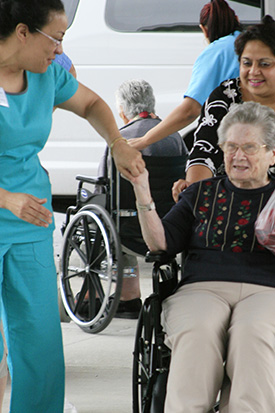Keeping seniors healthy and active is a top priority for caregivers, but finding a way that also keeps loved ones engaged and safe can be challenging. An innovative solution to this problem is sweeping across senior communities and public parks everywhere. Motion Wellness Systems by Xccent Fitness allows seniors to be socially and physically active, while working on fitness and balance.
We had the opportunity to sit down with Guy Chaham, Director of Sales of Outdoor Fitness at Xccent, Inc. to discuss senior mobility and the Motion Wellness System, which promises to improve senior mobility through a playground-like environment. Learn what it is doing for seniors across the globe.
The Importance of Senior Mobility to Healthy Aging
Maintaining and strengthening senior mobility is a key component of healthy aging. According to the World Health Organization, one third of seniors over the age of 65 fall at least once a year and about 50% of all admissions to long-term care communities are related to a fall.
The University of Alabama at Birmingham also took a closer look at the importance of senior mobility. Researcher Kellie Flood, M.D., of the UAB Division of Gerontology, said that: “Increased mobility limitations are the edge of that slippery slope that leads to loss of function.” In short, keeping seniors mobile increases strength, balance and coordination, which all work together to ultimately prevent falls.
In addition to fall prevention, keeping seniors active has a wide range of benefits. Physical activity can increase overall fitness and help seniors burn calories to maintain a healthy weight, in addition to improving cardiovascular health. Many activities are also done in a group setting which can help seniors avoid social isolation, a risk factor for dementia and depression.
Preventing Falls and Maintaining Mobility Using the Motion Wellness Systems
A new tool from Xccent Fitness called the Motion Wellness System, is helping seniors around the world stay strong and social, while improving balance and enhancing their overall health.
Similar to the nostalgic playgrounds of our youth, the Motion Wellness Tool has over 20 different activities ranging from fitness steps and ramps, to balance beams, chin up bars and a stretching board. Activities can be modified to adapt to the physical fitness level of seniors. While many Motion Wellness Systems are found within assisted living communities, some are located in public parks. The systems located in public parks have the benefit of multi-generational play and allow grandparents to actively play with grandchildren, which has many health and physical benefits.
In addition to creative play and exercise for seniors, the Motion Wellness System can also be used as a tool for nurses and therapists to evaluate the fitness level of a patient. Upon implementation, staff undergoes a program called “Train the Trainer” which shows how the tool can be used and adapted for specific therapy needs of the patient. From there, trainers and therapists can develop a specific training program to improve a senior’s fitness, balance and coordination.
An Expert on the Topic of Senior Mobility
Xccent Fitness was founded in 1976 and began in the commercial playground industry developing innovative and safe playgrounds for children. Chaham says that after working closely with a developer in Finland, the Motion Wellness System was developed following six years of research and many hours of senior movement observation. He adds:
“For years it has been recognized that there is a need for standardized interventions in primary care for seniors to avoid missed opportunities to reduce the risk of falls and fractures.”
In addition, Carole Lewis, a well known geriatric rehabilitation specialist, will be conducting an independent study on the system. She is currently conducting case studies in the Washington, D.C. area with George Washington University and Howard University. The company is eagerly awaiting data in the next six months for more information on how the tool is engaging people and improving balance.
A Global Movement Toward Senior Health and Mobility
The Motion Wellness System is currently located in assisted living communities, senior centers and public parks across the world. There are over 800 systems installed throughout Europe and the tool is currently gaining momentum in the United States and Canada.
While the product is still new, feedback from communities who have the product shows that it has been very successful in maintaining mobility and engaging seniors at all health levels.






